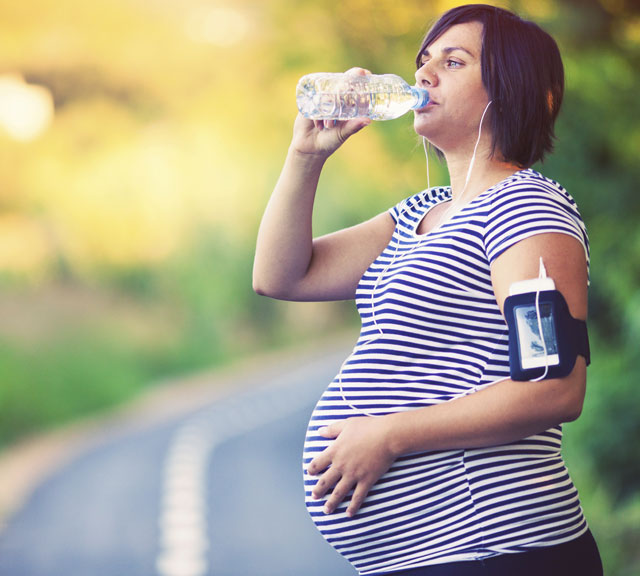- Baby on the Way
- Bone and Joint Health
- Brain Health
- Fitness and Exercise
- Heads Up
- Menopause
- Osteoporosis
- Prenatal Care
Fit at Every Age: You Can Do It!

Answer a few questions and we'll provide you with a list of primary care providers that best fit your needs.
Do you like fun and challenging activities when you exercise, such as step class, Pilates, belly-dancing, Tai Chi or yoga? If so, you’re not alone. More women than men engage in these kinds of stimulating activities for their regular fitness programs.
Whatever physical activity you choose, the benefits to your health are enormous. Regular exercising can energize you, lift your mood and self-esteem, reduce stress, help you deal with negative emotions and anxiety, and reduce the risk of depression and even dementia.
A word of caution: Before you embark on a vigorous exercise program, no matter your age, check with your physician to make sure you’re physically able and ready.
The goal is to ensure that women avoid an aggressive exercise plan that might produce bodily injury, as well as potentially harmful “fast and furious diets” resulting in extreme weight loss.
Start a program with stretching to avoid injuries and initiating exercises slowly, adding more steps gradually. This approach will help you succeed with the exercise program and reduce any tendency to feel frustrated too quickly.
Sports for Younger Women
Young women are at greater risk for not getting enough physical activity compared to young men, says the American College of Sports Medicine. Participation in sports — so beneficial in building confidence, self-esteem, and teamwork and goal-setting skills — has often been overlooked in young women and highly stressed in young men.
Thankfully, opportunities for girls to become involved in sports have increased over the last 10 years, and female sports participation is higher.
Research shows that young female athletes often have higher academic test scores and are more likely to graduate from college, are generally healthier, and have a lower prevalence of overweight and obesity throughout life. Risk for other diseases such as diabetes and heart disease are also lower in young female athletes. Sport participation also helps to build strong bones, which decreases the risk of osteoporosis as women age.
Girls who begin sports younger in life are more likely to continue to be active as they get older. That’s why it’s important to encourage young women to find activities and sports that interest them, so they can carry those healthy habits with them throughout life.
Strength Training for Women
Strength training isn’t just for men. Lifting weights has significant health benefits for women, including:
- Building your strength and ability to handle everyday activities more easily (think carrying heavy grocery bags)
- Increasing metabolism
- Helping to reduce body fat and leave you more toned
And you don’t have to worry about excessive muscles popping up if you lift weights. Women generally have too much estrogen in their bodies to build large amounts of bulk.
The American College of Sports Medicine recommends that healthy adults perform strength-training exercises at least twice a week, with eight to 12 repetitions per exercise.
Exercise during Pregnancy
The American College of Obstetricians and Gynecologists finds that women who have exercised and were physically fit before pregnancy can usually safely continue exercising throughout the pregnancy.
Women who were inactive before pregnancy or who have medical or pregnancy complications should consult their doctor before randomly beginning exercise after becoming pregnant.
The good news is that exercise often helps to reduce the physical discomforts of pregnancy and assists in mom’s recovery after the baby is born. Physical activity may also be especially beneficial for women with gestational diabetes.
Exercise may not be safe if you have any of the following conditions. Again, check this out with your physician before embarking on physical activity.
- Preterm labor in current or past pregnancies
- Vaginal bleeding
- Cervical problems
- Leaking of amniotic fluid
- Shortness of breath
- Dizziness and/or fainting
- Decreased fetal activity or other complications
- Increased heart rate (tachycardia), although heart rate is typically higher in pregnant women
- Certain health problems, like high blood pressure or heart disease
If you are pregnant, avoid high-impact activities such as horseback riding, water skiing, scuba diving, high altitude skiing, contact sports, any exercise that could cause a serious fall, and exercising on your back after the first trimester (because of reduced blood flow to the uterus). Do not do vigorous exercise in hot, humid weather or any exercise that involves holding your breath during exertion.
Staying Fit Before, During and After Menopause
Menopause denotes a woman’s last menstrual period; the time prior to this is called perimenopause, and the time following menopause is post-menopause. This period of changing hormone levels can last as long as 10 years and can cause a litany of symptoms, including hot flashes, sleep disruption, weight gain, loss of libido, short-term memory impairment or lack of focus, increased anxiety, fatigue and more.
But take heart! With an effective exercise program and good nutrition, many of these symptoms can be lessened or at least managed. If you’re especially affected by hot flashes, research has shown that a relaxation-based method, such as yoga with paced respiration, significantly reduces hot flash occurrence.
If you don’t exercise as you grow older, you’ll likely increase your risks of suffering from heart disease, obesity, high blood pressure, diabetes, osteoporosis, chronic back pain, insomnia, poor circulation and/or weak muscles. Many women gain weight after menopause, possibly because of declining estrogen levels. Raising your activity level will help keep the weight off.
Maintain Lifelong Health
Whether you’re a young, mid-aged, or older woman, regular exercise has undeniably positive effects on your mind and body. Being fit through exercise and diet lowers your risks for physical and cognitive decline and helps you achieve your personal best throughout your life. And take note: The younger you start exercising, the more likely you are to continue to be active in your later years!
Answer a few questions and we'll provide you with a list of primary care providers that best fit your needs.
Source: American College of Sports Medicine; American Council on Exercise; American College of Obstetricians and Gynecologists; Staying Healthy After Menopause




